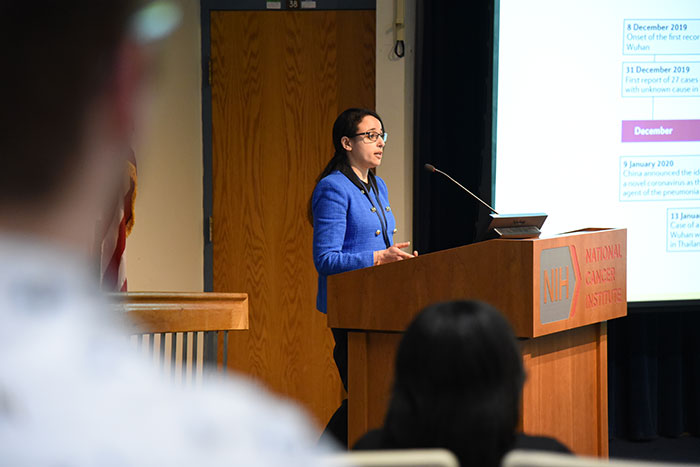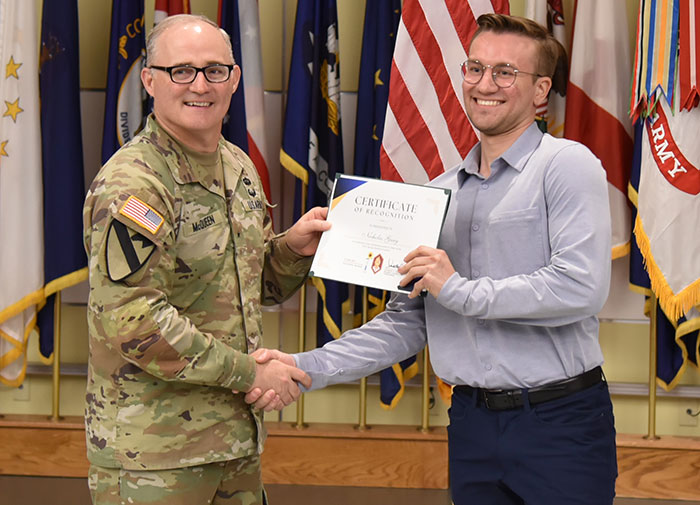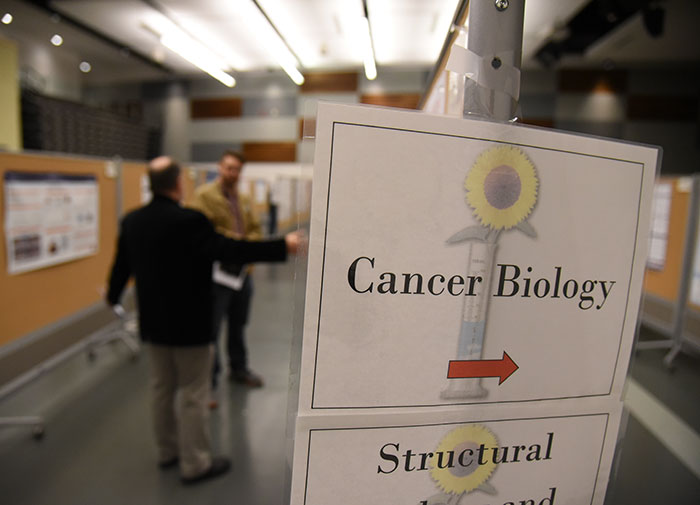Annual Spring Research Festival Expands, Seeks to Drive Collaboration

The U.S. Army Medical Research and Development Command's Spring Research Festival wrapped on April 26, following two days of speeches and presentations from members of the scientific community. The event, held at Fort Detrick, focused on several topics, most notably information gleaned from the recent COVID-19 pandemic and its application to future, potentially similar outbreaks.
"At our laboratories, we were sequencing from the very beginning, and that's why we were asked by the state of Maryland for help in genomic surveillance," said Dr. Heba Mostafa, associate professor of pathology at Johns Hopkins School of Medicine and the director of the Molecular Virology Laboratory at Johns Hopkins Hospital, during her keynote speech on April 25. According to Mostafa, her team submitted more than 21 thousand high-quality genomic profiles of the SARS-CoV-2 virus to Maryland state databases during the early days of the pandemic, an effort that helped track the spread and severity of COVID-19. "It was a terrible pandemic, absolutely," said Mostafa. "But there was silver lining in that it allowed us to aggregate a large amount of data to use in future surveillance, in future situations."
Mostafa and other speakers – as well as presenters involved in the Young Investigators Symposium – delivered their remarks at the National Cancer Institute at Frederick located on Fort Detrick. SRF attendees were also invited to participate in other events across the installation, including a scientific poster display at the Fort Detrick Auditorium and a vendor exhibition at the Capt. Jennifer J. Shafer Odom Fitness Center. The second day of the event featured a "Mini Lecture Series" featuring representatives from MRDC and NCI.


The poster session gave attendees an opportunity to meet with scientists in a one-on-one setting to foster conversations and potential future collaboration. Key topics covered during the session included developmental cell biology, infectious pathogens and epidemiology, as well as presentations on cancer biology, detection and diagnostics.
"The Spring Research Festival not only provides an opportunity for interagency engagement, but also promotes the collaborative efforts required to conduct the very important and lifesaving research being done at Fort Detrick," said Brig. Gen. Tony McQueen, Commanding General of MRDC and Fort Detrick. "This event gives scientists, researchers and engineers a chance to showcase their hard work and also interact with other laboratories and the public."
In addition to MRDC, organizations including the National Institute of Allergy and Infectious Diseases, the U.S. Department of Agriculture, NCI and the Naval Medical Research Command led planning efforts for the event. Participation and attendance from educational partners as well as local elected officials ensured a wide-ranging and in-depth educational experience.

- Applied and Environmental Biology:
Michael Fulcher, USDA & Susan Egbert, NCI - Biochemistry and Molecular Biology: Catherine Gill, NCI
- Cancer Biology: Sadie Milhous, NCI
- Detection and Diagnostics: Swapana Kannan, WRAIR
- Development and Cell Biology: Luke Ostendorf-Snell, NCI
- Emerging Technologies: Byeong Yeul Lee, NIAID
- Gene Therapy, Genome Editing and Genetics: Shreya Kordale, NCI
- Immunology: Ivypel Amankwa Asare, NCI
- Infectious Pathogens and Epidemiology: Lindsay Farr, NCI
- Informatics: Mohammad Alodadi, NCI
- Other: Nicholas Gary, WRAIR
- Scientific Core Services: Ryan Baugher, NCI
- Structural Biology and Chemistry: Wojciech Kasprzak, NCI
- Therapeutics, Vaccines, and Drug Delivery: Geetaram Sahu, USAMRDC
- 1st Place: Catalina Florez, USAMRIID
- 2nd Place: Lindsay Farr, NCI-Frederick
- 3rd Place: Karrie Spain, NCI-Frederick
- 1st Place: Elise Femino, NCI-Frederick
- 2nd Place: Sounak Sahu, NCI-Frederick
Michael O'Connor, mayor of the city of Frederick, attended the event on April 26, saying, "The work being done here at Fort Detrick and USAMRDC is so important to the country, to the bio-defense capabilities of our Armed Forces and more. But that work is also important to our city; it's what attracts businesses and drives economic development and in turn brings people and jobs here."
Following the event, the Spring Research Festival Awards Ceremony took place on April 28 to recognize and honor participants. Geetaram Sahu, a molecular biologist with MRDC's U.S. Army Medical Research Institute of Infectious Diseases, was named the winner of the Outstanding Poster Award from the Therapeutics, Vaccines and Drug Delivery category. Catalina Florez, a research scientist at USAMRIID, won first place in the Poster Blitz Presentation. NCI's Elise Femino was named the winner of the Young Investigator Symposium.
The full recording of the Spring Research Festival Awards Ceremony can be found below:
 An official website of the United States government
An official website of the United States government
 ) or https:// means you've safely connected to the .mil website. Share sensitive information only on official, secure websites.
) or https:// means you've safely connected to the .mil website. Share sensitive information only on official, secure websites.


